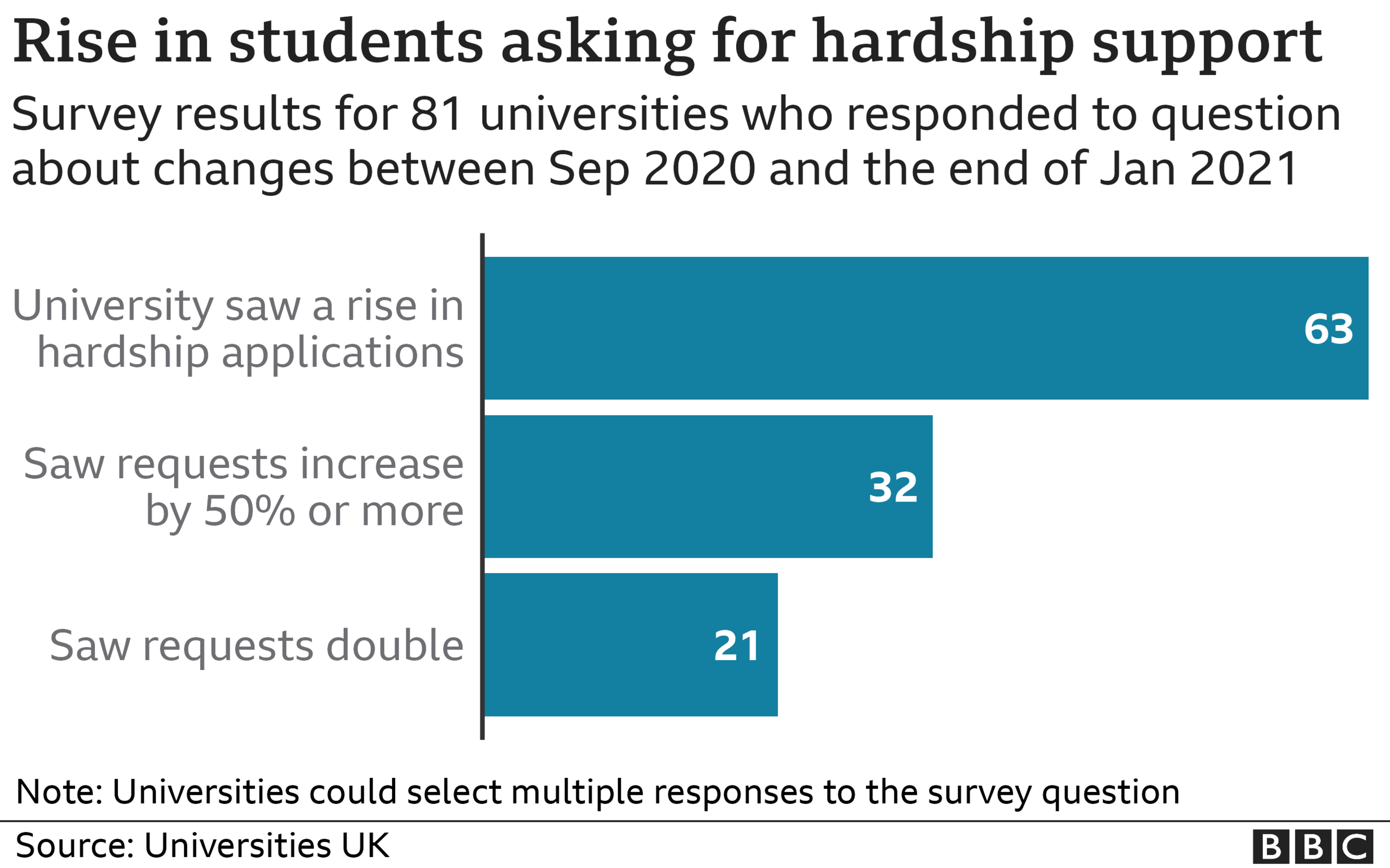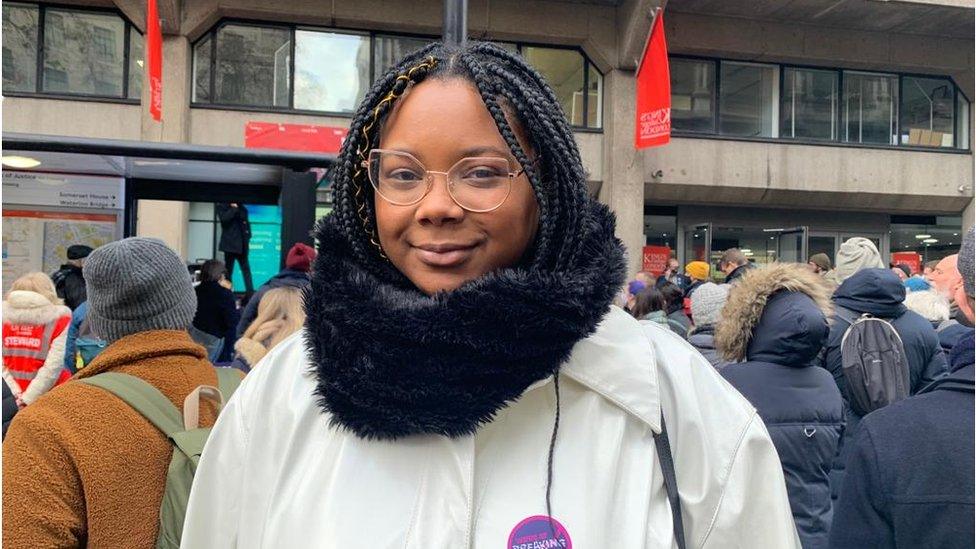Hardship funding requests rise at English universities
- Published

A loss of part-time work opportunities led to a rise in hardship funding applications between the second and third national lockdowns in England.
The number of students seeking extra money because of financial problems doubled in 25% of English universities in the last academic year.
More than 75% of universities that responded to a Universities UK (UUK) survey had seen an increase in requests for hardship funding.
Students relying on part-time work were most affected during lockdowns.
The government said it had made an extra £85m available for students "in the greatest need" in 2020-21.
Students can apply for hardship funding directly from their universities or colleges.
Individual institutions determine how much is given out - and many introduced emergency Covid hardship funds.
The survey suggests a significant increase in requests in English universities between September 2020 and the end of January 2021 - during the second and third national lockdowns - compared with the same time period in the previous academic year.
Of 81 universities that responded:
63 saw a rise in applications
32 saw requests increase by 50% or more
21 saw requests double.
'Nowhere was hiring'

Oly, 19, who asked for his surname to be withheld, moved to Birmingham, in September 2020, to study specialist hair and media make-up.
He had hoped to find part-time work on a make-up counter, to pay for his private student accommodation, but found the "entire make-up industry pretty much just came to a halt".
"I ended up looking for other things like being a cashier at a supermarket... but nowhere was hiring," he said.
In January, living alone during the third lockdown and trying to feed himself on £15 a week, he applied for his university's hardship fund.
He had hoped for about £800 but was given £250.
"I was happy, because even if it wasn't as much as I'd asked for, it was still enough that I could get by for a little bit longer," he said.
Oly managed to find temporary work when Covid restrictions eased and now lives in cheaper accommodation - but he described last year as "probably the most difficult time in my life".
"I'm definitely having to budget somewhat more than I would if last year we hadn't had a pandemic," he said.
"I kind of wish I got my chance to be the naïve first-year, where you could just go out and have flat parties and have fun - and maybe have a bit of a struggle with finances, but that's kind of normal."

'Huge stress'
Not far away, in Coventry, a 21-year-old recent graduate, who wished to remain anonymous, told BBC News she had received £1,500 in hardship funding, after struggling to find a job in the pandemic.
With her parents living abroad and no possibility of moving home, she described her financial situation as "bleak". Then, her mother fell ill.
"I was having to budget myself immensely to try and save as much of my student loan to avoid homelessness after graduating," she said.
"The hardship fund literally helped me not be homeless after university and meant I could go see my mum after almost losing her."
Now in full-time work, the "huge stress and anxiety" of financial difficulties last year continues to affect her mental health.
"I am under constant fear to save as much as possible so that I don't ever end up in fear of being homeless again," she said.
UUK said a large proportion of the increase in requests had come from students from low-income households and those paying for private accommodation they had been unable to access in lockdowns.
Applications from postgraduate and international students also increased because of a lack of access to maintenance support and a loss of part-time work opportunities.
Restrictions affecting the retail and hospitality industries meant many could not work during term-time or earn money to save during university holidays.
'Extraordinary resilience'
Prime Minister Boris Johnson announced a four-week "stay at home" order in England, on 31 October 2020.
England then went into a tier system of restrictions, before a third national lockdown was announced in early January.
A second survey, in March, found the number of applications had continued to rise.
A spokeswoman for UUK - which represents about 115 universities in England and 25 across the rest of the UK - said students had shown "extraordinary resilience" and "for some, these financial difficulties are likely to be ongoing".
"Universities have done all they can to step up support for these students, including using hardship funds, offering food vouchers, supporting students encountering digital poverty, and investing in mental health and wellbeing services," she said.
She added universities were working to make students aware of support services and urged those struggling to contact their institution.
'Extreme pressure'
Research by the National Union of Students suggests about a fifth of students were in part-time employment in January, compared with about a third in September.

Larissa Kennedy joined staff and students striking outside King's College London this month.
The union's president, Larissa Kennedy, said: "The funding available for those hoping to access education is not designed to cover the cost of living, meaning students are under extreme financial pressure."
She urged the government to bring back maintenance grants, introduce a rent cap and "redress exploitative housing costs".
Universities Minister Michelle Donelan said: "No student should have to worry unduly about their financial situation whilst they are focusing on their studies.
"This government made an additional £85m of funding available to universities for the 2020-21 academic year, which targeted students in the greatest need, for example those struggling with additional costs from having to maintain accommodation in more than one location due to the pandemic.
"This was on top of an existing £256m that universities could draw on towards student hardship funds."

THE CHRISTMAS FOOD TRENDS YOU NEED: From vegan Wellingtons to deluxe macaroni cheese
WINTER WALKS: Join Reverend Kate Bottley as she walks over the ruins of Jervaulx Abbey

- Published3 December 2021

- Published18 November 2021

- Published17 November 2021
